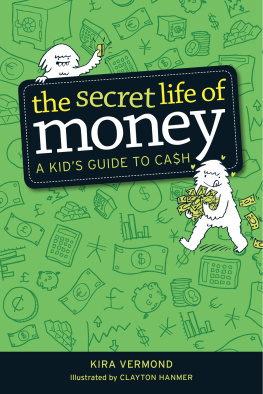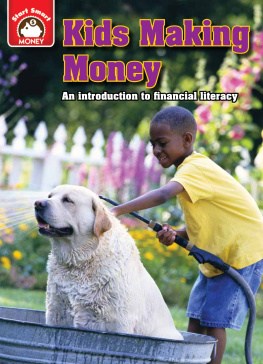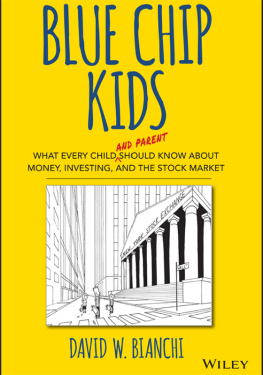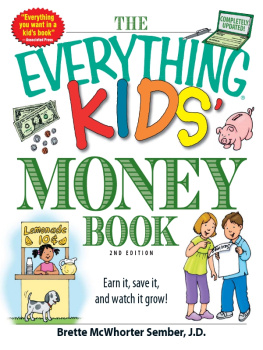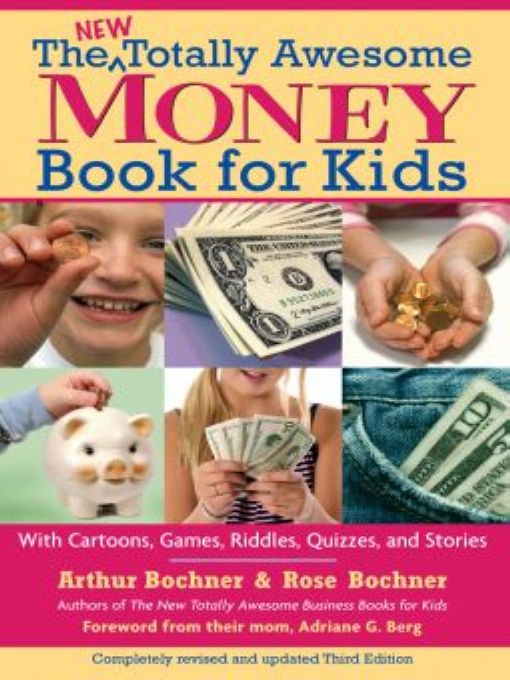Table of Contents
Also by Arthur Bochner & Rose Bochner
The New Totally Awesome Business Book for Kids (and Their Parents)
By Adriane G. Berg
Moneythink
How Not to Go Broke at 102: Achieving Everlasting Wealth
Your Wealthbuilding Years
Financial Planning for Couples
Your Kids, Your Money
Gifting to People You Love
Investment Spy (CD-ROM)
Warning: Dying May Be Hazardous to Your Wealth
How to Stop Fighting About Money and Make Some
How Good Guys Grow Rich (with Milton Gralla)
Keys to Avoiding Probate and Reducing Estate Taxes
Making Up for Lost Time
This book is dedicated to
Stuart Bochner, a k a Dad a k a Stuart Spendthrift, and thanks for thinking up the great games.
by Adriane G. Berg
The buck starts here
How happy are you with the way you handle money? Youd be a major exception if you were satisfied with your money skills. In 2006 the oldest of the baby boomers turned sixty. In fact, 10,000 of us are celebrating our sixtieth birthday every day. And although we are the most educated generation in history, most of us are ill prepared to afford retirement. Too many of us are living in our bank, having put most of our discretionary income into paying off mortgages, instead of investing.
Its no secret why that has happened. We never developed a comfort zone around investing. Perhaps we rebelled against the fears of our Depression-era parents. Or perhaps we were too indulged and never expected to pay the piper. Whatever our story, it is clear that our money habits, good or bad, are the cause of our current financial situation and that those habits were derived from very early childhood experiences.
When I look at my own children, Rose (now fifteen) and Arthur (now twenty-four and the chief author of this book), and my friends children, I see that Gen Y and X have done better. But not good enough. If you are a young parent of a young child, you still must learn about money by your wits. You certainly didnt learn much in school. This books mission is to be sure that Web Gen members blow us out of the water when it comes to money savvy and that they, in turn, become the giving generation, because they have so much to give spiritually, financially, and intellectually.
Although this book is filled with facts to strengthen your childs money knowledge, I believe that the material dealing with your childs money skills is far more important. More important still is your childs money attitude, or money personality. In more than three decades as a money writer, journalist, and advisor, I have met numerous millionaires. I even coauthored a book with a billionaire. What made them so successful was a discipline and facility with money in all its aspects. Whether they figured their taxes, invested in real estate, ran their business, or gave to charity, it was with authority, comfort, and responsibility. They always came out ahead. You have the power to bring such ease into your childs future, whether or not you have brought it into your own.
If you work side by side with your children in reading the material in this book, you will help them achieve a level of confidence, familiarity, and perspective that is far more important than hard factsand much harder to gain in adulthood.
And if we want our children to be confident about money handling, including investing and credit, we will have to teach them ourselves. Although times are changing slowly, the plain fact is that financial decision making is not taught in school, is not often taught at home, and does not come naturally. The result for most of us is lifelong anxiety and sometimes-disastrous mistakes in our money management.
Regardless of the economic times in which we live, it is always possible to earn money in America, but its getting much harder and more complicated to invest and preserve our money. The viability of Social Security is in question, and already we must wait more years to collect the benefits were due. Medicare is also slated to run at a deficit as Americans age. Currently, retirement is a thirty-year-long unpaid vacation. For our kids, it will be longer still. Our growing longevity is a miraculous trend, but it costs money. Like you, I want my children to have a familiarity with money that I never had growing up. When my friends and I look back on things, we agree that our ignorance about money matters was more of a handicap than was a lack of inheritance or limited earning capacity. It just takes too long to catch up when you dont begin to grasp the basics until youve already worked for several years.
In my book Your Wealthbuilding Years, I emphasized the importance of early planning to those eighteen and older. But there is an even better time to start. How about fifth grade! I wish that my folks, my school, or both had paid as much attention to developing my money skills as they did to developing my social skills.
Of course, when I was a kid, Columbus was packing for his first sail. So youd think that by now things would be different. The schools are trying, and this books publisher hopes to share this book with many schools. There are some wonderful inroads being made in schools, but they are certainly not reaching every student. The fact is this: I had no financial education when I went to elementary school in the 1950s, Arthur had none in the 1980s, and Rose had noneand its 2006. Rose is about to graduate from a terrific public middle school in New Jersey. She took required health education classes and even voluntary ski school, but nothing about money management was even offered.
Things are most likely the same for your children. They learn about cholesterol, free radicals, food allergies, and, of course, sex. Such information is rightly considered part of their preparation for the future. Yet not one word is spoken to prepare them to spend, save, or invest the money they will inevitably earn. There is a growing recognition of the need for attention to money matters, but only a very few children are lucky enough to receive any such basic training through their schools.
At least for now, teaching our children about money starts and stops with us. But I know how hard it is to get children, especially preteens and teens, to pay attention to our teachings. For several years I volunteered to lecture at a childrens business camp sponsored by the Foundation for Free Enterprise, part of the New Jersey State Commerce and Industry Association. It was quite an experience, preparing fifteen-year-olds to manage their money and contribute to a pension plan that would not exist for almost ten more years. They had trouble grasping the concept of retirement, were used to relying on their parents for money, and were already using credit cards! But the effort paid off. The kids loved the material and absorbed it all. But teaching ones own children is a lot different than teaching a room full of other peoples kids.


